Trump, Putin discuss Iran’s nuclear program
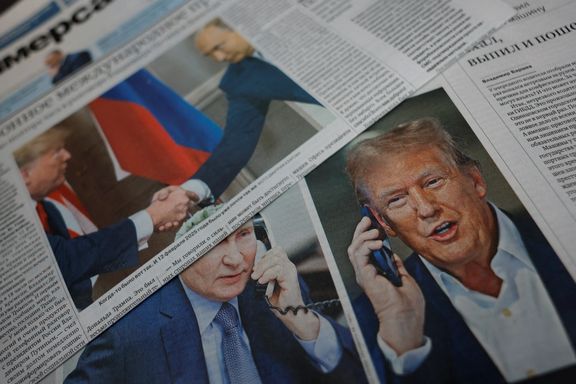
US President Donald Trump and his Russian counterpart Vladimir Putin discussed Iran's nuclear program in a phone call between the two leaders on Wednesday.

US President Donald Trump and his Russian counterpart Vladimir Putin discussed Iran's nuclear program in a phone call between the two leaders on Wednesday.
“The issues of Middle East settlement, Iran's nuclear program, and bilateral economic relations between Russia and the United States were also brought up during the conversation,” said the Kremlin in a statement.
The conversation also touched on the Ukraine crisis and a prisoner exchange agreement between the Washington and Moscow.
Their call hinted at future in-person meetings, potentially in Saudi Arabia. Trump suggested the summit could address broader issues, including Iran and Ukraine.
It is a turnaround after Russia's envoy in Tehran had said a day earlier that Western countries are attempting to sideline Russia and China in discussions about Iran's nuclear program due to their close relations with Tehran.
“The Russian Federation has been in this format (P5+1) from the very beginning. And, naturally, we expect that the relevant negotiations will continue in this format, since we have information that, unfortunately, Western countries are trying to wean Russia and China from this process.”
Russia continues to play a pivotal role in Iran's nuclear infrastructure, leading initiatives such as the expansion of the Bushehr Nuclear Power Plant.
A key focus of the call was Ukraine. As reported by Reuters, following over an hour of conversation with Putin, Trump said that the Russian leader, who initiated a full-scale invasion of Ukraine in 2022, expressed a desire to end the war.
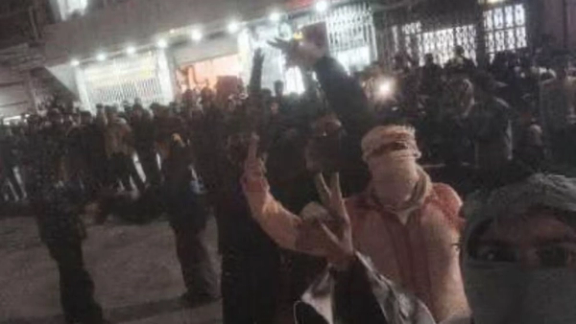
As Iran faces deteriorating economic conditions, anti-government protests have erupted across the country, protesting ongoing power shortages and food price hikes, videos obtained by Iran International show.
In Dehdasht, located in Kohgiluyeh and Boyer-Ahmad province, locals gathered for the fourth night in a row on Wednesday amid tight security measures.
Over the past three nights, protesters chanted slogans aimed at the Supreme Leader, including "Death to the dictator" and "This year is year of blood, Khamenei falls with a thud."
While government-affiliated media attempted to portray the unrest in Dehdasht as tribal conflicts, videos of the protests sent to Iran International reveal a focus on economic issues.
In response, authorities have conducted arrests, detaining at least six protesters, including two women, on Tuesday evening. In the preceding two nights, four more protesters had also been apprehended.
Iran International has identified five of the detainees as Atefeh Tahernia, Jaber Foroughi, Kamran Bouzari, Amirhossein Jafari, and Pouria Barati.
According to some posts on X, the youth of Dehdasht have called for continued protests and urged neighboring regions to join them, saying that "silence in the face of oppression is betrayal."
Videos sent by citizens from the four corners of the country show people in Shiraz, Yazd, Tehran, Parand, Shazand, Bukan, Hashtgerd, and Kamyaran chanting slogans in protest against repeated power outages.
In Arak, citizens once again gathered to protest air pollution. Due to its proximity to power plants and industrial centers, Arak has long suffered from air pollution, but conditions have worsened this year.
The protests coincide with the anniversary of the 1979 Iranian Revolution, a time marked this year by economic instability. The national currency recently reached a record low, with the US dollar valued at 940,000 rials before experiencing a small rebound.
Citizens have been sending videos to Iran International voicing their grievances about power outages and accusing the government of waiting for the end of the ten-day revolution anniversary celebrations before resuming widespread cuts.
In a video, one citizen is heard sarcastically remarking that the blackouts represent the "peaks of progress that Mr. Khamenei shamelessly claimed we have reached."
Key items like rice, dairy products, and oil have experienced price increases of as much as 110% in the last year, intensifying the financial pressure on families.
Protests have also erupted in capital Tehran, where power outages have prompted night-time chants against the Islamic Republic.
On Tuesday, widespread blackouts in the capital were attributed to high gas consumption and limited supplies, forcing school, government offices closures across most of the provinces.
Iranian officials, including President Masoud Pezeshkian and Parliament Speaker Mohammad Bagher Ghalibaf have praised Khamenei’s rejection of negotiations with the United States during recent 1979 Revolution anniversary celebrations.
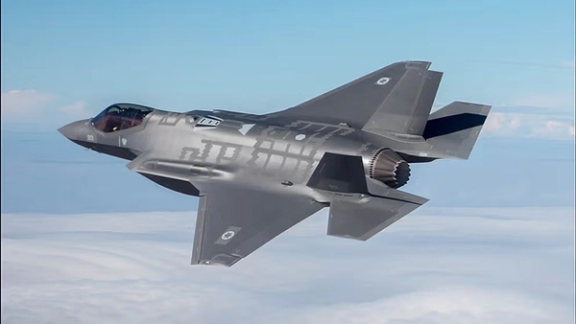
Israel is considering attacks on Iran's nuclear sites and views its Mideast adversary as vulnerable, US intelligence agencies assessed in the waning days of the Joe Biden administration, the Wall Street Journal reported on Wednesday.
Israel was considering significant strikes on Iran in 2025 and viewed President Donald Trump as more amenable to their plans, the paper cited officials familiar with the assessment as saying.
US intelligence cited the risk of further conflict in the Middle East and characterized Iran as weakened following an Oct. 26 Israeli attack on Iran, adding that Israel views the window for denying Iran a nuclear weapons capability as fast closing.
Iran denies seeking a nuclear weapon but Israel says is Mideast nemesis wants an atomic bomb and must be denied the power to destroy the Jewish state.
Trump, long an opponent of foreign wars, reimposed the so-called maximum pressure campaign on Iran of his first term this month but said he much preferred a deal and described any reports of a US-Israeli strike on Iran as "greatly exaggerated".
Diplomatic room for US-Iran talks for a nuclear deal appeared to narrow in the past week as Iran's Supreme Leader Ali Khamenei rejected the idea of negotiations and relatively moderate President Masoud Pezeshkian endorsed the stance.
Israel has publicly broached the idea of an attack in the past.
“Iran today is more exposed than ever to damage to its nuclear facilities," Israeli Defense Minister Israel Katz said in November.
Since the Oct. 7, 2023 attack on Israel by Iran-backed Hamas militants from Gaza, Israel has been locked in a region-wide conflict with Iran and its armed allies.
Escalating a conflict with Hezbollah in Lebanon in late September, Israel began to gain the initiative and solidified its advantage with a direct air attack on Iran in retaliation for a missile salvo from the Islamic Republic.
Israel and the United States said those attacks mostly knocked out Iran's anti-aircraft capabilities and left it exposed to any future strikes.
Analysts widely view Iran's fortified and underground nuclear sites as potentially beyond the ability of Israeli bombers to destroy and may require American help or collaboration.
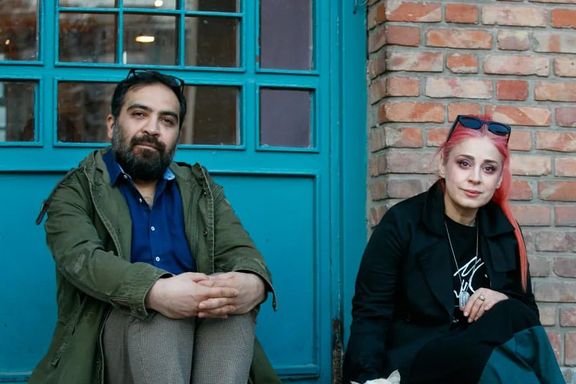
The Iranian makers of My Favorite Cake, a critically-acclaimed film about a widow's search for companionship, have been summoned to a revolutionary court in Tehran over multiple charges including violation of public morality and ethics.
The film tells the story of a woman striving to live out her desires, including for intimacy, in a country where women's rights are heavily restricted.
Maryam Moghaddam and Behtash Sanaeeha have been summoned to Branch 26 of the Tehran Revolutionary Court, according to separate summonses they shared on Instagram, and are set to stand trial on March 1.
Moghaddam and Sanaeeha have been charged with propaganda against the Islamic Republic, producing, distributing and screening a film with obscene content, violating public morality and ethics and screening a film without a proper exhibition license.
The indictment cites their roles as producers, writers and directors of My Favorite Cake, accusing them of attempting to screen, distribute, and reproduce the film, which authorities say constitutes grounds for legal action.
The couple had previously been barred from attending their film's premiere at the Berlin Film Festival last February. They were set to attend the Swedish premiere in September when they found out that they cannot leave.
British newspaper The Guardian's named My Favorite Cake 2024's second-best film.
At Berlin Film Festival, the film won the Prize of the Ecumenical Jury Competition and the FIPRESCI Prize. It also won the Chicago Film Festival's Silver Hugo for in the New Directors Competition.
The film is just one of an increasing number of new Iranian films being produced without the Culture Ministry's permission in defiance of the country's strict ideological censorship and hijab regulations for actresses.
Many filmmakers are bypassing regulations requiring them to obtain approval at various stages of production, from screenplay inception to final screening and entry into international film festivals.
These new independent films challenge compulsory hijab rules, depicting Iranian women without the mandated head covering. This defiance has grown, especially following the 2022 Woman, Life, Freedom protest movement.
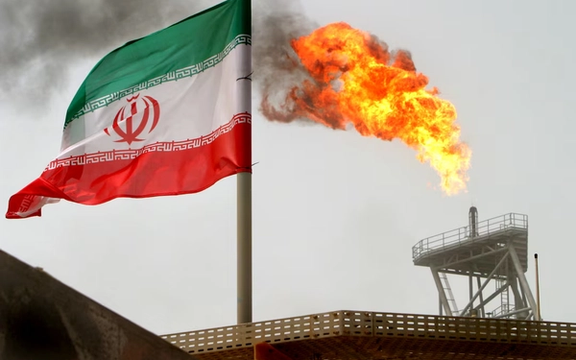
US sanctions on Iran and Russia are warding off buyers and stranding vessels laden with their oil at sea, Reuters reported on Wednesday citing trade sources and analysts.
A series of stepped-up US sanctions beginning in October on Russian and Iranian tankers, companies and entities facilitating their oil trade is increasingly hampering oil exports which are the main source of revenue for both countries.
US President Donald Trump this month reinstated the so-called "maximum pressure" campaign on Iran from his first term, aiming to drive its oil sales to zero.
Since the sanctions were ramped up in the fourth quarter of last year, OPEC member Iran has faced a challenge chartering tankers to move its supplies, Reuters cited Xu Muyu, a senior analyst at energy consultancy Kpler, as saying.
Kpler figures indicated that Iranian oil in so-called floating storage stood at an over one-year high exceeding 25 million barrels, with around 80% of the volume at sea off Malaysia and Singapore.
The total amount of Iranian oil at sea rose by as much as 20 million barrels already just since the start of 2025, three analysts cited by Reuters said.
A ban last month by the Shandong Port Group on US-sanctioned tankers has deprived Iran access to the operator of top crude importer China's largest oil terminals receiving Iranian, Russian and Venezuelan oil.
China accounts for 95% of Iran's oil exports, but it does not purchase the oil directly.
Instead, small independent refineries typically Iranian oil after it is blended with crude from other countries, ensuring it is not labeled as Iranian by Chinese customs in order to comply with sanctions against Iran.
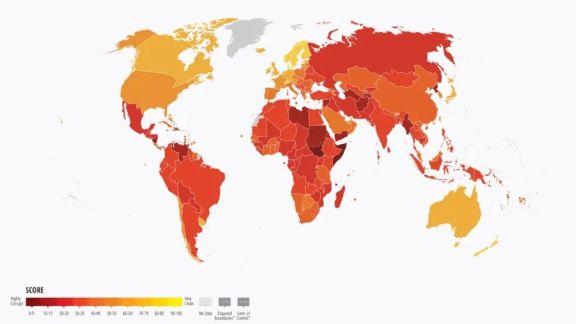
Iran has slipped to its lowest corruption ranking yet since global watchdog Transparency International began tracking, sinking to 151 out of 180 countries.
According to Transparency International’s 2024 Corruption Perceptions Index (CPI) released Tuesday, Iran fell by one spot from the previous year, scoring 23 out of 100, where zero means most corrupt and 100, least.
The CPI, the most widely used global corruption ranking in the world, assesses countries and territories annually on how corrupt their public sector is perceived to be by experts.
It covers various markers of public sector corruption, including the misuse of public power for private benefit without facing consequences, bribery, diversion of public funds, nepotistic appointments and access to information on public affairs or government activities.
Each country’s score is drawn from 13 different corruption surveys and assessments by a variety of institutions including the World Bank and the World Economic Forum.
Transparency International reported that 47 countries recorded their lowest scores since the current ranking system was introduced in 2012.
Iran's score was lower than Iraq's at 26 but higher than Lebanon's at 22.
South Sudan, Somalia and Venezuela held the lowest scores in 2024.
Transparency International said the "state of anti-corruption efforts in the Middle East and North Africa region remains bleak," attributing the stagnation to the near-absolute control of political leaders.
The global watchdog added that countries experiencing conflict, severe restrictions on freedoms, and weak democratic institutions, rank lowest on the index.
The watchdog said that leaders in the region benefit from wealth directed toward themselves while suppressing dissent to maintain power.
Their authority, it added, has also stalled progress on global issues such as combating climate change and advancing gender equity.
In October 2023, a report by the World Bank has put Iran among the worst countries in the world in terms of Worldwide Governance Indicators, with a Voice and Accountability Index score of -1.45, placing it among the lowest for political participation, free expression, and media freedom.